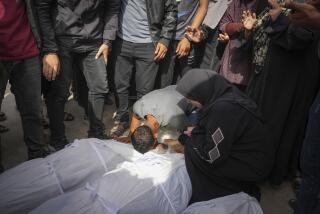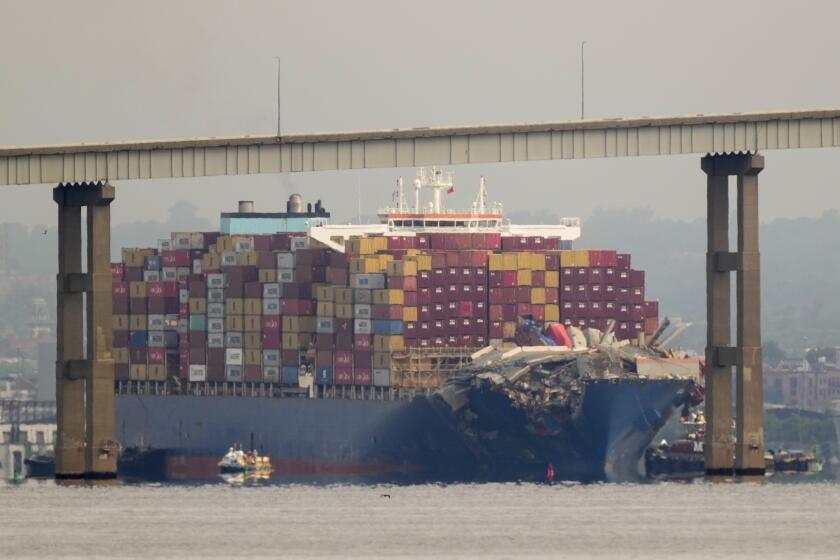Floods Give Private Media in Poland a Chance to Shine
Twenty stories above the Oder River, whose ravenous waters have been devouring this weary Silesian city for nearly two weeks, sits an exhausted man in a camouflage vest tending a mug of nasty-looking coffee.
Jacek Scioblowski’s office is about the size of a walk-in closet. The floor is a jumble of wading boots and discarded rain gear. The ashtray desperately needs emptying, and cellular telephones are recharging in every outlet.
“The cameras roll in right where you are standing,” Scioblowski tells a visitor, who is squeezed between his desk and a pair of doors. “That way, I can pass on the most important news as quickly as possible. And if I am lucky, I get three hours of sleep.”
As Poland and much of Central Europe wrestle with the region’s most devastating natural disaster on record, the overworked 37-year-old broadcaster and his fledgling private television station are serving up a textbook lesson in the role of the free media in a democracy in distress.
Beneath frayed umbrellas and behind soggy mounds of sandbags, Poles are being provided by the great floods of 1997 with their first experience in crisis management, freedom-style. The enormous success of TV Lower Silesia’s nonstop flood coverage fits a pattern of democratic breakthroughs--and some setbacks--as the former Eastern Bloc’s biggest democracy feels its way through the most serious national calamity since Polish Gen. Wojciech Jaruzelski declared martial law in 1981.
“In many ways, we are seeing the best of democracy,” said Stanislaw Huskowski, vice chairman of the Wroclaw City Council. “Under communism, we not only had a totalitarian regime, but we had no means of communicating and helping each other out--no institutions to rally around.”
Nearly a dozen flood-related home pages have been born on the Internet. An array of Polish rock musicians has performed a benefit concert in the drenching rain, selling 23,000 copies of a flood-relief recording in just 12 hours--nearly half the way to Polish “gold” status.
Millions of Poles have reached into their pockets to help flood victims, with collection boxes even circulating among crowds during President Clinton’s recent visit to Warsaw. And the newly independent media, from TV Lower Silesia here in Wroclaw to Radio Vanessa in a small town near the Czech border, have provided an unprecedented grass-roots link among ordinary residents.
“It has really been a spontaneous response, beyond anything I could imagine,” said Konrad Jancewicz, among hundreds of volunteers fortifying Wroclaw with sandbags against a second major crest of flood waters expected here today.
Spurred by the gravity of a deluge that has killed more than 100 people across Central Europe, 2-year-old TV Lower Silesia has become the most authoritative source of flood information in this region of 750,000, the largest urban area to be hit by the flooding, now in its third week.
The station’s standard fare of steamy Latin American soap operas and U.S. films and crime series has given way to news and public service programming, at times around the clock. The blunt-speaking Scioblowski has become the conscience of Wroclaw, lecturing residents about doing the right thing (don’t imperil your neighbor’s house to save your own) and calling to task agencies and institutions deemed too slow in helping out (chief among them, the state-owned WARTA insurance company).
“Private television is now a power in this city--everyone is watching,” said Huskowski, the city councilman. “It has been the only connecting tissue between all the groups trying to deal with the flood.”
Comparisons with martial law are unavoidable. During that man-made disaster, TV also played a defining role, but of a hugely different character. There were no private stations. Government-employed journalists were required to wear military uniforms. And democratic activists--including Scioblowski, then a Wroclaw law student--were rounded up and put in prison.
“To compare things now and then is a lot like saying, ‘Hey, you have a great car. But what about your car in the Stone Age?’ ” Scioblowski said. “There were no cars in the Stone Age.”
There were no computers either, but like private TV, the spilling Oder and its tributaries have helped push Polish cyberspace into a new popular realm. Home pages are providing addresses and phone numbers of displaced residents, detailed maps of flooded areas, traffic advisories, health tips and advice on protecting property against rising waters.
“We are shocked that so many people are looking at our pages,” said Dariusz Modzelewski, 29, one of seven employees at a small Wroclaw advertising agency that has created one of the most extensive Web sites (https://www.ic.com.pl).
The Krzyki Advertising Agency pages have been visited more than 16,000 times since being launched last week. The employees, mostly in their 20s, work on three jury-rigged computers mounted on wooden horses in a bare-bones office. The Web site is in Polish, but the workers cull most of the flood preparedness information from U.S. Internet sources and translate it.
“There is so little information on such things available here in Poland, so we are getting our hands on anything we can,” Modzelewski said.
The ruling former Communists and their allies were slow to recognize the immense proportions of the disaster, and once they did, were nearly paralyzed by their own ghosts from the past.
Apparently fearful, at least in part, of reviving memories of martial law just two months before September’s parliamentary elections, the government has rejected calls for an official state of emergency in flooded areas. The emergency law, dating to the days of martial law, had never been revised to exclude draconian measures revoking political freedoms, including the ability to hold elections; a new constitution that corrects the problem does not take effect until October.
In a late-night session, the Polish Parliament last week hastily amended the old statute to give President Aleksander Kwasniewski authority to sidestep the martial law provisions if a state of emergency were declared. But Kwasniewski, himself a former Communist, has been reluctant to exercise his newfound power.
“The government has done nothing for us,” complained Henryka Rachwalik, waiting for a rubber boat to ferry her, a bottle of drinking water and a canister of butane to her Wroclaw apartment. “We are on our own.”
More to Read
Start your day right
Sign up for Essential California for news, features and recommendations from the L.A. Times and beyond in your inbox six days a week.
You may occasionally receive promotional content from the Los Angeles Times.






